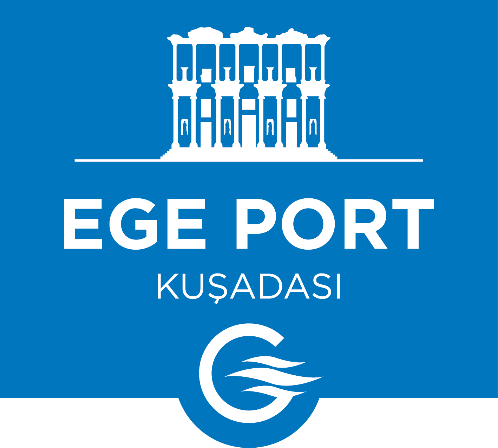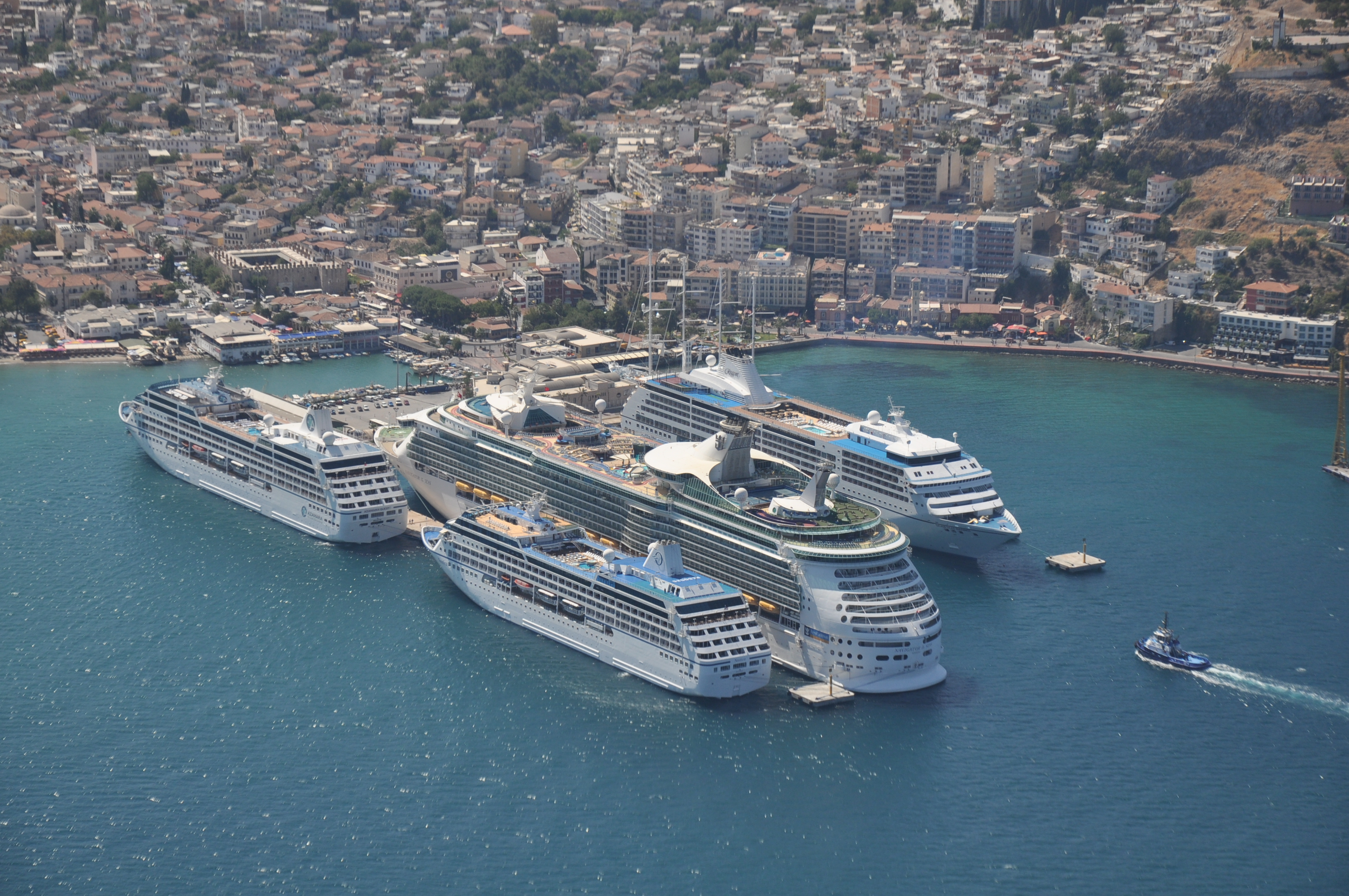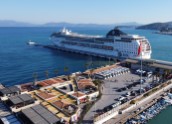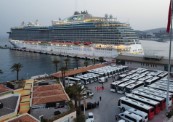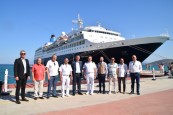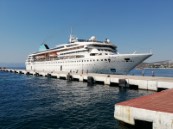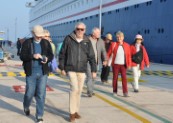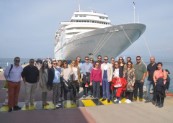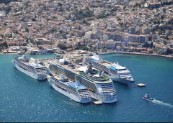Ege Port Kuşadası has set a new benchmark by becoming the first cruise port to be granted Ecoports certification. Michele Witthaus finds out more.
Ege Port Kuşadası operates the Port of Kuşadası on the west coast of Turkey, serving cruise ships on Aegean itineraries. In 2003, the port earned the distinction of being Global Ports Holdings’ first acquisition.
The deal included pilotage, tugging, mooring, sheltering, security, fresh water supply, waste collection, passenger terminal services, and diving and bunkering services to cruise ships and ferries visiting the port.
A big part of the attraction of Kuşadası for tourists is its close proximity to the ancient city of Ephesus. Thanks to development works completed in 2011, resulting in pier improvements that allow it to accommodate even the largest Oasis-class ships, Ege Port is now a firm fixture on an increasing number of cruise itineraries and has become the busiest cruise port in Turkey. The two finger piers can berth up to four large vessels, or four smaller and two large vessels.
Ege Port is no stranger to sustainability, having attained several major certifications in the past few years. Aziz Güngör, East Med Ports Regional Director at Global Ports Holding and General Manager at Ege Port Kuşadası, explains the background to the port’s pursuit of environmental compliance and best practice.
“Since 2004, Ege Port Kuşadasi is ISO 14001 Environmental Management System certified by international institutions without interruptions where independent audits are conducted every year. Ege Port is also certified with, ISO 9001 Quality Management System and BS OHSAS 18001 Occupational Health and Safety Management Systems. We call this a triple management system; an integrated management system. In addition to all these as of 2015, through annual audits, Ege Port is Green Port certified by the Ministry of Transport & Infrastructure and TSI (Turkish Standards Insititution).”
In July 2019, the port chalked up another first by winning Ecoports certification, becoming the first cruise port in the world to do so. “We are delighted that Ege Port Kuşadası has been recognised in this way and this is just the first step as we look to apply environmental best practice to our global portfolio of cruise ports,” says Emre Sayin, Global Ports Holding CEO. “We recognise the improvements that cruise ports can make to become more sustainable and as the world’s largest cruise port operator we are keen to play our part.”
“Our highest motivation was to become the first cruise port to be certified by Ecoports Port Environmental Review Systems (PERS),” Mr Güngör says: “Our company culture, long-term plans and the experience that we have gained in the integrated management system since 2004, have brought us to the certification process with Ecoports PERS. We have successfully completed the process in a 6-month period.” He sees the Ecoports certification as a best practice sharing. "Ecoports sharing best practices with the ports around the world helps follow the new environmental approaches globally. Besides, Ecoports brings some innovative approaches while reducing the operating costs of ports. While using these innovations, you can also use ready-made approaches to quickly reach your goals. All of these contribute to the sustainability of cruise ports within the ecoports project.”
It helps that the port has a long-established sustainability culture, says Mr Güngör. “We have already adopted important environmental policies within the scope of the Green Port certificate, under the accreditation of ISO 14001 Environmental Management and Turkish Standards Institute, long before the Ecoports certification. In this respect, being an environmentalist port was already a company culture for us.”
Besides the Ecoports programme, Ege Port is taking a variety of other steps to ensure all activities at the cruise terminal are environmentally friendly. “In this context, we are making significant investments in our Waste Reception Facility. Within the port, we operate a facility for the dewatering of oily liquid wastes such as sludge and bilge water received from cruise ships. We provide 100% recycled waste oils that have been dewatered, while the chemically and biologically treated water can be used in garden irrigation. We also save energy in our port through the usage of LED technology in all our illumination systems. “Moreover, some of the energy sourced is through solar panels. In the coming years, we are working to prevent the emission of exhaust emissions generated by parked tour buses (running their engines for air conditioning purposes). This project will be brought to life soon.” In addition to these initiatives, the port is working to reduce the impact of solid waste. “Efficient segregation of ship-based solid wastes is ensured and an appropriate recycling process is carried out for each different type of waste. Our ultimate goal is to become a port that produces zero waste."
The port is also investigating the possibility of investing in shore power, although there is some caution in this regard due to the practicalities of running this type of infrastructure. “We are doing various studies to feed the cruise ships with alternative energy sources such as onshore power systems that will stop the use of gensets while the ship is in port,” explains Mr Güngör. However, the realisation of this project brings some infrastructure problems. “Cruise ports located in city centres – like us - are facing big challenges in this matter. An average-sized cruise ship needs approximately 10 megawatts of installed power. For a port capable of berthing four ships at the same time, it would need a total of 40 megawatt power, which is the equivalent of an amount that can feed a city network of considerable size. Along with the investment, some legal regulations need to become appropriate as well. In order to evaluate this issue, we continue our joint evaluations and work with the Turkish Ministry of Transportation & Infrastructure.“ Looking forward, the prospects for strong cruise growth at Ege Port mean that the sustainability measures at the port will be tested and will need updating over time.
Mr Güngör notes: “Kuşadası is an extremely popular cruise destination. In this respect, the number of passengers will continue to increase. The most important long-term goal is to manage the environmental impacts that this growth will create on the environment in the most accurate way; supply renewable energy to the ships during the period that they are in the port.” The growing number of vehicles that converge on the port during busy cruise periods is another concern. “An average of 70 tour buses are parked in our facility whenever there is a cruise call. In hot climatic conditions like we have, the engine has to run 30 minutes before passengers arrive in order to cool the bus. We are working to collect all these exhaust emissions at a single point and eliminate them during the operation. “The most significant environmental impacts arising from cruise operations are the emissions. We are trying to reduce emissions as much as possible with the targets we have set. Again, separating the waste that is sourced from both the port facilities and the ships, and recycling it to create zero waste is among our biggest targets.” Good partnerships with stakeholders are crucial to the success of sustainability initiatives at any busy cruise port. This is especially the case for a port set in a country such as Turkey, which welcomes the sixth highest number of tourists in the world.
“The Ministry of Environment & Urbanization, the Ministry of Culture & Tourism, and the Ministry of Transport & Communications are in intense interaction with the entire sector in order to ensure the sustainable growth of the tourism sector,” says Mr Güngör. “The ‘Zero Waste’ project that was launched in Turkey as of 2019 received great support. Through the synergy of this project, all institutions and stakeholders in which Ege Port interacts closely, are working together. Locally, our port works closely with non-governmental organisations such as Aydın Metropolitan Municipality, Kuşadası Municipality, Provincial Directorate of Environment of Aydın Governorship and TURMEPA (Clean Seas Association).”
Original Release of the GreenPort Magazine can be found in the link
